SFH meets District Councils on environmental hygiene (with photos)
The Secretary for Food and Health, Professor Sophia Chan, today (July 24) met the chairmen and vice-chairmen of the environmental hygiene committees of the 18 District Councils (DCs) and listened to their views and suggestions on enhancing environmental hygiene in Hong Kong.
Professor Chan said, "During the past year, the resources allocated by the Government on environmental hygiene increased from $3.8 billion in 2017-18 to $4.3 billion in 2018-19. However, the co-operation of the general public by exercising a strong sense of civic-mindedness and self-discipline is essential for solving the environmental hygiene problem. We hope that the general public and the community could proactively participate in and support the government measures to maintain environmental hygiene together."
Attendees noted that the Food and Environmental Hygiene Department (FEHD) extended the scheme on installation of Internet protocol (IP) cameras at illegal refuse deposit black spots to all districts starting from June 6 this year to combat illegal dumping of refuse and improve environmental hygiene. FEHD officers will closely monitor these black spots and suitably adjust its action plans in light of actual circumstances, such as changing IP camera locations to enhance the effectiveness of enforcement actions. The scheme will be reviewed one year after implementation.
In addition, the FEHD has set up 19 dedicated enforcement teams to strengthen enforcement actions against cleanliness offences. Mechanisation and automated technologies including 360-degree cameras, pressure washer surface cleaners, mini-mechanical sweepers, leaf blowers and solar-powered compacting refuse bins have also been adopted in several areas with a view to enhancing efficiency and occupational safety. The FEHD will review and improve the relevant equipment from time to time so as to better meet public needs.
The Pest Control Steering Committee, led by the Food and Health Bureau (FHB), held a meeting in mid-July. Various policy bureaux, government departments and organisations discussed the implementation of targeted measures to solve the problems of mosquitoes, rodents and biting midges as well as strengthen collaboration. Collaboration among various sectors of the community and all relevant government departments is necessary to implement rodent control work at source, including maintaining environmental hygiene.
In respect of mosquito control, the FEHD has been stepping up the control work by adding five surveillance areas in July 2018. Furthermore, the survey frequency for all of the 57 surveillance areas has been increased from one week per month to two weeks per month and the survey frequency in all sea and land ports has been increased from two weeks per month to a weekly basis starting in July 2018.
The community has been very concerned about the problem of biting midges in recent years. Although biting midges in Hong Kong are not a human disease vector, they constitute a nuisance to the public. Last year, the FEHD invited a Mainland expert on biting midges to visit Hong Kong. According to his advice, a one-year territory-wide survey on biting midges was conducted. Initial results of the survey revealed that the peak season for biting midge activity is from May to September every year. As such, the FHB has advised the relevant departments to strengthen the prevention and control measures against biting midges before May annually.
The problem of rodent infestation must be tackled at the root. Apart from regular rodent prevention and control work conducted by the FEHD, other relevant departments have also stepped up their work. The FEHD will assist relevant departments to enhance their anti-rodent work based on the successful experience of its Anti-rodent Operation at Designated Target Areas. On rodent infestation in construction sites, the FHB has requested works departments to maintain environmental hygiene and rodent prevention and control when implementing new works projects.
"We will consider the views and suggestions raised by the attendees and continue to review the effectiveness of various cleaning measures and make timely adjustments," Professor Chan said. She appealed to the DCs and the public to lend support to the work of the Government to keep Hong Kong clean and reduce the spread of diseases.

